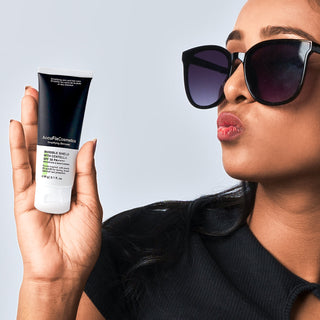Despite increased awareness, many people still fall for outdated or incorrect beliefs about sunscreen. These myths can lead to poor habits and unnecessary sun damage — even for people who think they’re doing the right thing. So let’s bust the 7 most common sunscreen myths that tend to keep showing up on social platforms again and again.
Myth #1: Sunscreen Causes Skin Cancer
Truth: Sunscreen helps prevent skin cancer — it doesn’t cause it.
Some worry about ingredients like oxybenzone, but there's no scientific proof that FDA-approved sunscreens cause cancer. In fact, regular sunscreen use reduces your risk of melanoma and other skin cancers caused by UV exposure — which is a known, proven carcinogen.
Myth #2: I Tan, So I Don’t Need Sunscreen
Truth: Tanning is skin damage — not protection.
A tan is your skin’s response to UV injury. Even if you don’t burn, UV rays still cause DNA damage, early aging, and increase your risk of skin cancer. No tan is safe. Sunscreen helps protect your skin from these long-term effects.
Myth #3: People with Dark Skin Don’t Need Sunscreen
Truth: All skin tones need sunscreen.
Darker skin has more melanin and may not burn as quickly, but it’s still vulnerable to hyperpigmentation, aging, sunburn, and certain skin cancers — often detected later. Sunscreen is essential for every skin color.
Myth #4: Sunscreen Blocks Vitamin D Production
Truth: Sunscreen may reduce vitamin D slightly, but not enough to harm your health.
Even when properly applied, sunscreen still allows some UVB rays through. Your body needs very little sunlight to make vitamin D. Safer sources include food and supplements — not unprotected sun exposure.
Myth #5: Natural Oils Work as Sunscreen
Truth: Oils like coconut or olive oil do not offer real sun protection.
This myth originated after a single 2009 study suggested that coconut oil could act as sun protection with SPF 7. But this study was conducted in a petri dish and not on human skin, which leaves a lot of room for inaccuracy.
Myth #6: Makeup With SPF Is Enough
Truth: SPF in makeup isn’t enough on its own.
Makeup with SPF can add some protection, but it’s usually not applied in thick enough layers to give you the listed protection. Always apply broad-spectrum sunscreen underneath your makeup.
Myth #7: You Don’t Need Sunscreen on Cloudy or Winter Days
Truth: Up to 90% of UV rays can pass through clouds and reflect off snow or water.
Even on cloudy or cold days, UV rays are present and can still harm your skin. Daily sunscreen is essential year-round, no matter the weather.
✅ Final Reminders:
- Choose SPF 30 or higher, broad-spectrum
- Reapply every 2 hours
- Don't rely on makeup, oils, or myths for protection
Recommended Products

👉 Still unsure which SPF is right for acne-prone skin? Read this blog next
Can sunscreen really cause cancer?
No. Sunscreen is proven to reduce your risk of skin cancer. It protects your skin from harmful UV rays — the real cause of most skin cancers.
Do people with dark skin need sunscreen?
Yes. All skin tones are vulnerable to UV damage, pigmentation, and skin cancer. Sunscreen is essential for everyone, every day.
Will sunscreen prevent me from getting enough vitamin D?
No. Even with sunscreen, your body still absorbs enough UVB to make vitamin D. You can also get it from food and supplements.
Is makeup with SPF enough protection?
Not really. Makeup with SPF can help, but you likely won’t apply enough for full protection. Always layer with a proper sunscreen underneath.
Does tanning mean I’m safe from sunburn?
No. A tan is your skin’s response to damage — it doesn’t protect you. Tanning increases the risk of aging, pigmentation, and skin cancer.

